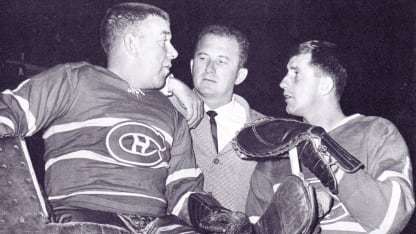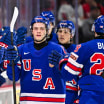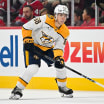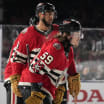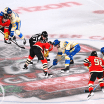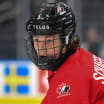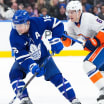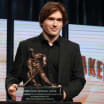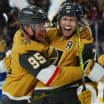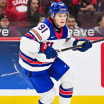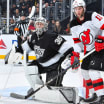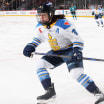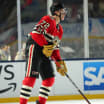Remembering Fisher, distinguished Canadiens writer
NHL.com columnist recalls friend who died Friday at age 91
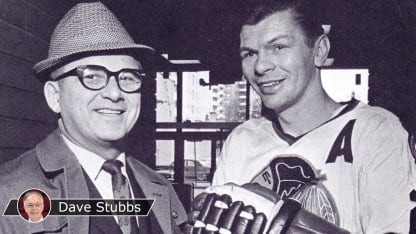
It was mid-April 2006, and the dean of hockey writers on this continent, or any other, was about to be feted by the Montreal Canadiens for his 50 years, plus one, of covering the NHL's most storied team.
And Red knew absolutely nothing about it.
RELATED: [Commissioner Gary Bettman on Red Fisher | Red Fisher's obituary]
One of the greatest and most respected observers of hockey the game has ever known died Friday at age 91. There isn't a player Red covered, an owner or general manager whose team he was around, or reader who absorbed his every typed or broadcast word who doesn't have a memory or a story to share.
For a few years at the Montreal Gazette, Red was my sports editor. For a few years, our roles would be reversed.
As crusty as he forever tried to make himself look, this is the Red Fisher I knew:
In many long talks, plumbing his reservoir of stories, I gained a great love of hockey history that I bring to many features about the game of yesterday.
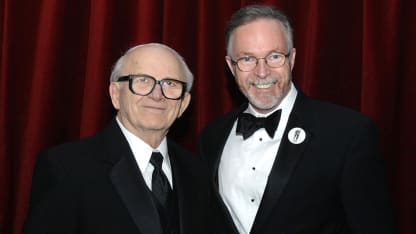
And then one day at the Gazette, Red simply dropped his personalized three-volume encyclopedia set on my desk. "The Trail of the Stanley Cup," written by Charles L. Coleman, covers hockey from 1893 to 1967 and is regarded as the definitive history of the pursuit of the Cup from its birth through NHL expansion.
As precious as it is rare, the set could have earned Red many hundreds of dollars had he sold it. He'd not hear of it.
"It's yours," he said. "Enjoy it."
I have, almost every day since it landed on my desk, the first volume's inside cover bearing a small NHL shield logo that reads: "Presented to Red Fisher With Compliments of the National Hockey League."
For weeks before he was honored on that April night, the Canadiens had been organizing a small pregame ceremony at Bell Centre to pay tribute to a man whose hockey writing career had begun on March 17, 1955. That would be the infamous Richard Riot game, of all things.
Red, four months before his 80th birthday, had already been up to the press gallery to unpack his bag at his seat directly over center ice. He loved his Macintosh iBook G4 laptop, a dinosaur by today's standards, more for its desktop photo of Canadian country-music star Shania Twain wearing a midriff-baring Canadiens jersey than for the hundreds of stories on its hard drive.
Back down one flight of stairs in the media dining room, he ladled himself a bowl of soup and complained that it wasn't hot enough, which had been a running gag since the arena's 1996 opening.
Red returned to his seat with a plastic cup of Chivas Regal, the Canadiens keeping a bottle across from the hot-dog grill expressly for him.
And then the Canadiens sprung their surprise on him: a small, tasteful ceremony to salute his half-century on the beat. And how perfect that they went old school with their gift: an engraved, gold-plated Montblanc Solitaire pen.
"I wouldn't have wanted to do anything else," Red said of his career, deeply moved and clearly surprised by a ceremony the dozens of Montreal media members in attendance had known about for weeks.
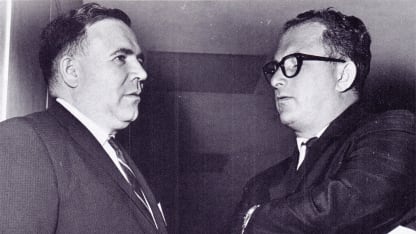
The presentation was made by the Canadiens' then-majority owner, George Gillett Jr., and then-president, Pierre Boivin. They were joined by former captains Jean Beliveau and Henri Richard -- Red covered each of their combined 21 Stanley Cup championships -- and alumni association president Rejean Houle, winner of five Cup titles and Montreal's general manager from 1995-2000.
The five men were among Montreal's six owners, seven presidents, seven GMs and 15 captains to that point since Red began covering the Canadiens, writing about 17 of the team's 24 Stanley Cup championships.
"Though some people think I've covered all 24," he said.
Frank Brown, NHL group vice president, communications, flew up from New York with a framed award on behalf of the League, the plaque reading, "In honor of five decades of distinguished reporting."
Also on hand was Red's longtime broadcasting friend and traveling partner, Dick Irvin Jr., and Canadiens communications vice president Donald Beauchamp, whose uncle, the journalist Jacques Beauchamp, covered the beat and rode the rails with Red in the 1950s.
During the first period that night, the Canadiens showed a tribute on the scoreboard to mark Red's remarkable career to that point (he retired six years later): 4,500-plus games, including exhibitions, the Stanley Cup Playoffs and Stanley Cup Finals not involving the Canadiens. A live camera showed him at work in the press gallery.
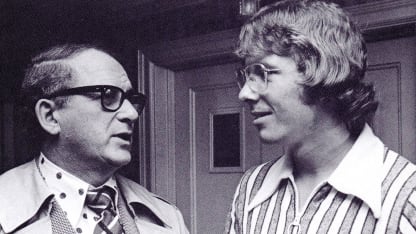
Those of us who knew Red as a friend and needled him endlessly would tell you the Canadiens would more appropriately have given him a quill, a bottle of ink and a few parchment sheets, the writing instruments he used when he began covering hockey.
(Only under his breath that night was he saying about the magnificent pen, "Shame it won't improve the dressing-room cliches.")
Red was back in his press gallery seat the following week for Montreal's regular-season finale against the New Jersey Devils. He said he planned to keep working, as he wrote in "Hockey, Heroes, and Me," his 1994 autobiography, "until I get it right."
Which legends of the game and his generations of readers would tell you he had done decades ago.
Red's autobiography detailed a career that focused on hockey but was much more than that. He covered professional football, boxing, the Olympics and pro wrestling while editing the sports section of the Montreal Star with clarity and vision.
Oh, how Red loved the rasslers; one of his favorite chapters in the book was about the Wrestling Rabbi, who made one trip to the Forum, argued with the promoter, then lost to the flying leg scissors in a match that lasted seconds before he fled Montreal, never to be heard from again.
"Red is the most honest newspaperman I ever met, but he's still a bloody liar,"' Richard said that April night, the Pocket Rocket then bursting into laughter. "Near the end of my playing days, more than 30 years ago, he said to me, 'Henri, when you retire, I'll retire.' "
To Richard, Red grinned and said, "So I lied."
Beliveau recalled once playing referee between Red and coach Toe Blake, whose high-decibel argument following one game was headed for fisticuffs.
"I heard a lot of noise from Toe's little room in the Forum," Beliveau said. "I don't know what started it, but you know those two -- they were going hard at it, getting closer and closer.
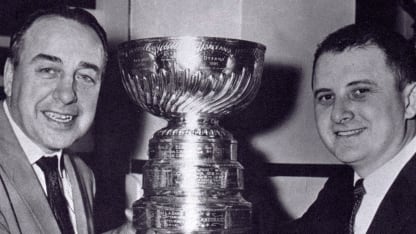
"You could always count on Red. I have great respect for his professionalism. You could talk to him without having everything in the paper the next day."
Dickie Moore, Red's best friend in hockey, had played four seasons with the Canadiens before the eager writer arrived on the beat full time. The two had first met while Moore played for the junior Montreal Royals and Canadiens and Red was learning the trade with the weekly Montreal Standard. Their friendship was unshakeable until Moore's death in 2015.
"When I was in the doldrums, Red would have a helping word on the trains, in the hotels or during a walk to keep me going," Moore said. "Sometimes his words were strong, but they were fair, never hurtful. This is why he gained so much respect from the players.
"Because of that, he got close to most of us, which is why he got the scoops. He's going to go forever. He's so well-appreciated, and he always seems to say the right things."
That night, with an iBook at Red's fingertips and a Montblanc in his blazer, a long-ago story of a more primitive writing instrument came to mind.
It involved the folding of his employer for a quarter-century, the Montreal Star, and the tale he told for years, with only slight variations, which might even be true:
He related arriving at the Star building on that autumn day in 1979, his professional life irretrievable behind padlocked doors and a security guard, his career seemingly at its end.
"They won't even let me in the door to gather my personal effects," Red said, and by now you were hanging on every word as his voice tightened with emotion.
A long pause. Finally:
"So I'm glad I kept those three typewriters."
